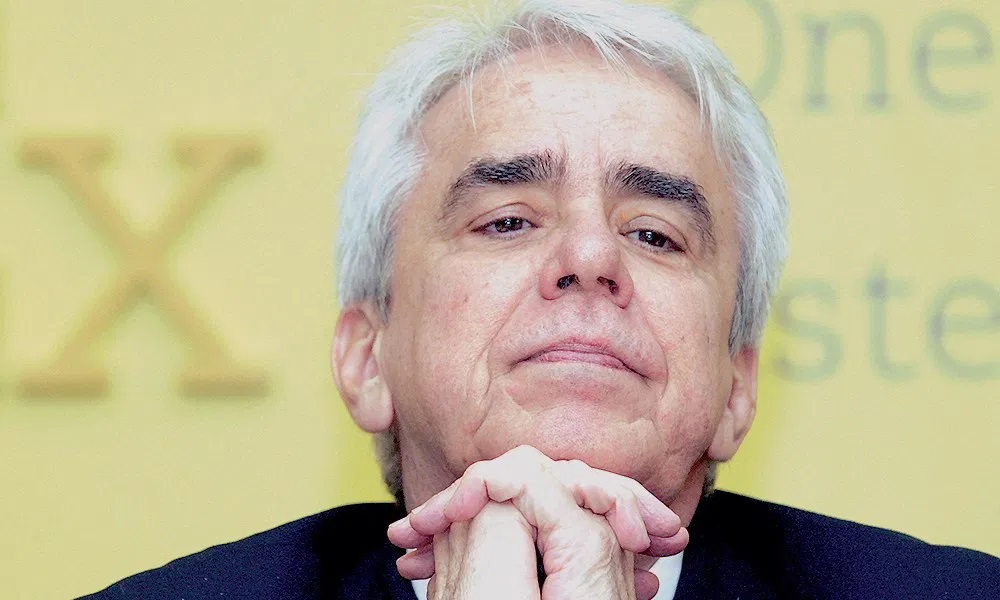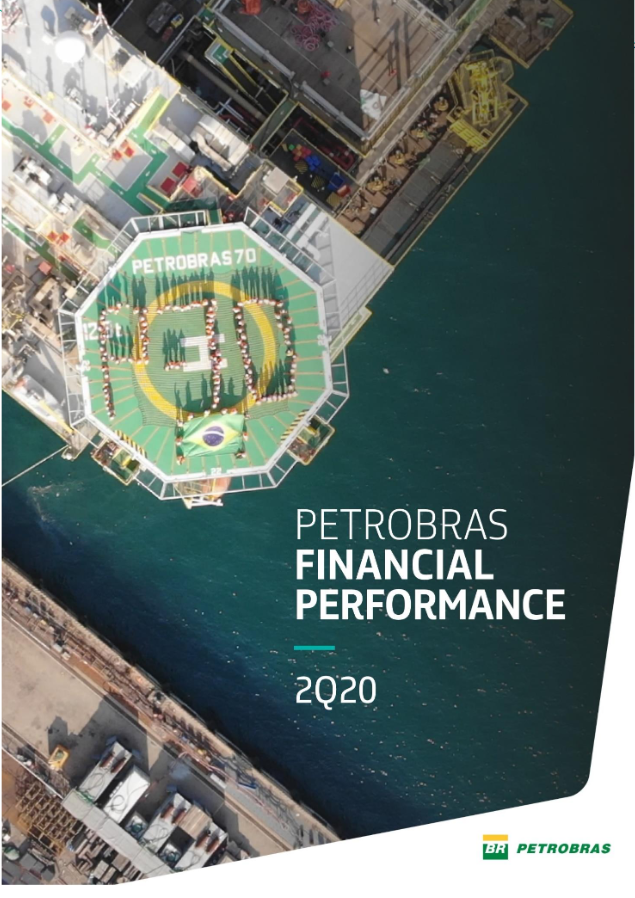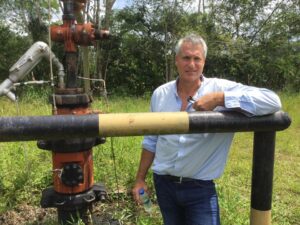
(Petrobras, 31.Jul.2020) — Brazil state oil and gas company Petrobras reported financial and operational results for the second quarter of 2020. The company’s Chief Executive Officer Roberto Castello Branco had this to say before the company’s conference call.
Dear Shareholders,
I am glad to be able to tell you that we are running the ship safely through uncharted waters. We are very proud of our team whose talent and professional dedication allowed us to overcome, so far, the enormous challenges faced by our company.
The outbreak of a major global health crisis caused a deep and synchronized global recession that hit severely the global oil and gas industry.
Prices of Brent oil of US$ 65 per barrel in February collapsed to US$ 19 in April 2020 due to a global demand contraction of 25%, threatening to generate a sudden stop of cashflow. A liquidity shock has an effect similar to a heart stroke, as it has the potential to stop the continuity of companies’ operations. Amidst deep uncertainty, the prospect for continuous cash burn was very real.

As in a war, the unprecedented scale and speed of the global pandemic compelled us to move swiftly, as we know that serious crises produce winners and losers and the winners tend to be those who respond faster. And we do aim at being a winner. We are working hard, fast and efficiently to engineer a J-shaped recovery, ending up better than we were in the pre-COVID era. Of course, the safety of our operations and our employees as well as respect for the environment continue to be one of the pillars of our strategy.
The world was moving fast but now is moving even faster inspiring creativity and innovation and requiring stronger resiliency.
We see the crisis as an inflection point, from which we must accelerate the execution of our transformational agenda – including digital transformation – to allow Petrobras to make a turnaround in its long history of value destruction, becoming an effective value creator to you and to the Brazilian economy.
In the short-term, our number one priority was to protect health – the physical health of our employees and the financial health of our company.
We have created a crisis committee, composed by the company´s executive committee with daily meetings. We have established two teams reporting directly to the crisis committee, one to deal with the health crisis (EOR) and the other in charge of liquidity and cost cutting (liquidity team).
To minimize the impact of COVID-19 on our workforce we decided to put in place a combination of social distancing with a strategy of screening, testing, tracing and quarantining, which is performing very well. Until this week we have applied more than 120,000 tests on our employees and the service supplier’s employees, within a universe of 135,000 people.
Working at home has been successful, even contributing to increase productivity. For the future we plan to keep around 50% of the personnel working at corporate activities in home office. However, it will be limited to three days per week in order to leave room for more effective culture preservation, team building and mentoring of younger professionals.
The operational personnel will be gradually returning to their normal work shifts, with the exception of those older than 60 and/or with co-morbidities. This will be implemented very carefully at metered pace to minimize the risk of new infections.
Our capex budget for 2020 was reduced to US$ 8.5 billion from US$ 12 billion and we have already launched initiatives to cut costs by more than US$ 2 billion, in addition to the postponement of cash disbursements, including executive salaries and annual bonuses, the last tranche of the 2019 dividend and part of the payments due to large suppliers.
In addition to the withdrawal of US$ 8 billion in revolving credit lines, we issued 10 and 30-year bonds amounting to US$ 3.25 billion and took almost US$ 2.0 billion in bank loans, in order to build a liquidity buffer to survive a worst case scenario of average oil prices of US$ 25 per barrel from April 2020 until yearend.
Integrated actions of the logistics and sales teams were able to maximize exports of crude oil and low-sulphur fuel oil, which reached all-time high volumes. This move was instrumental to offset the effect of the strong contraction of the Brazilian demand for fuels, especially in April – a month to remember in the history of the oil business – and to preserve liquidity.
More than 10,000 employees enlisted for the voluntary dismissal program (PDV), about 22% of our labor force, and will be leaving the company mostly this year and the remainder in 2021. This will imply cost savings of almost US$ 800 million per year.
The rationalization of the executive structure is estimated to lower costs by more than US$ 200 million per year.
Each of the 45 departments was required by the crisis committee to submit plans involving cost cutting. The company is carrying out several other initiatives to diminish costs and to realize efficiency gains.
As a consequence of the decrease in headcount and adoption of home office, we plan to reduce the current occupation of 17 administrative buildings – 23 in 2018 – to only 8 by 1Q21, implying cost savings of almost US$ 30 million in 2021.
Jointly with the elimination of several inefficiencies and logistics cost, we are working to minimize inventories and to rationalize storage space, reducing the number of warehouses to 25 from the current 45.
Like its parent company, our wholly owned subsidiary Transpetro is engaged in a program to strengthen resiliency and service quality. In spite of the strong global recession the divestment program is well and alive.
In 2020 we have already launched 20 processes of asset divestitures and sales concluded up to now generated almost US$ 1 billion in cash receipts for Petrobras. At the moment, we are discussing with the winning bidder for RLAM the final details to formalize a sales and purchase agreement.
We expect the approval for the conclusion of sale of Liquigás – a LPG distribution company – to be given by CADE, the Brazilian anti-trust agency, in the following months. Oil and gas production is running smoothly and the E&P business obtained several achievements.
Búzios is beating new records: on July 13th production reached 844,000 boed. The FPSO P-70 started operations at the Atapu field and the first oil came on June 25 th.
The TOTUS (True one trip ultra slender) technology was successfully utilized for the construction of a well in the Golfinho field in the post salt. Drilling and completion took only 44 days, contributing to reduce costs by 50%.
Our main innovation projects dedicated to E&P, such as EXP-100, PROD-1000, PEP-70 and HISEP, are showing progress. If successful they have the potential to create significant value through a dramatic decrease of breakeven prices.
The company is ordering the construction of 3 FPSOs to operate in the second phase of Búzios, the first order in 8 years. Two of them will have a capacity of 180,000 bpd and the third one of 225,000 bpd. This will be the biggest FPSO operating in Brazilian seas and one of the biggest in the world.
Average lifting costs, on a cash basis, decreased to U$ 4.9/boe in 2Q20 from US$ 8.4/boe in 2Q19, a 41% year-on-year fall. At the pre-salt fields it reached US$ 2.4/boe in 2Q20.
After a sharp fall to levels lower than 60%, driven by demand weakness for fuels, the average utilization factor of our refineries is hovering around a range of 75-80%.
The Digital Twin project is already being implemented at the refineries with excellent results. We expect it to generate an additional revenue of US$ 154 million in a yearly basis through efficiency gains.
Our ESG agenda continues to move ahead steadily.
Total emissions and their intensity are in a downward trend since 2015. Petrobras became a supporter of the Task Force for Climate-related Financial Disclosure (TCFD) and is strongly committed to the goals of the Oil and Gas Climate Initiative (OGCI).
Renewable diesel was successfully tested and is waiting for ANP’s approval, the Brazilian oil and gas regulatory agency, to begin production. The product proved to reduce GHG emissions by 70%, when compared to regular diesel oil and adds 15% more motor efficiency than the traditional biodiesel.
Our low-sulphur oil, compliant to IMO 2020 rule, gave us an edge as a supplier of marine oil.
Some global investors recognized the tremendous efforts of Petrobras to eliminate corruption as well as to strengthen corporate governance. The company was invited to return to be a member of PACI (Partnering Against Corruption Initiative). Petrobras had left in the wake of the Lava Jato scandal.
TRI, the rate of recordable injuries, at 0.67, continue its downward trend, setting a new global benchmark for the oil and gas industry.
As a good corporate citizen, we have been acting to mitigate the effects of the global pandemic on the Brazilian population, donating clinical tests, medical and hygiene materials, diesel and gasoline to fuel vehicles of public hospitals and using scientific capacity – scientists and high performance computing – to help innovations in the health field. In addition, food and LPG bottles are being donated to low-income communities.
Digital transformation is key to the future of Petrobras as an agile and successful company. It has been accelerated and deployed on a company wide basis. Projects are addressing costs, efficiency, GHG emissions and safety.
Among other initiatives, we are implementing 94 RPAs (robotic process automation) to replace workers allocated to perform manual and repetitive processes.

To support digital transformation and artificial intelligence high performance computing capacity was multiplied almost 7 times relatively to 2018.
As mentioned before, the global shock forced us to interrupt the deleveraging, and total debt ended the first half of 2020 at US$ 91.2 billion, US$ 4.0 billion higher than at December 31st, 2019.
However, net debt decreased by US$8.0 billion in the first half of year, evidencing that there was no cash burn. Operational cash flow was strong enough to increase our cash holdings.
Given the recessionary scenario and drop in Brent oil prices of approximately 40% against 1H19 average, this was a major achievement.
Operational cash flow totaled US$ 13.2 billion in 1H20 – US$5.5 billion in 2Q20 – against US$ 9.9 billion in 1H19. Free cash flow reached US$ 8.9 billion in 1H20 against US$ 6.3 billion a year ago.
Therefore, we were able to make this week a US$ 3.5 billion partial pre-payment of the US$ 8.0 billion revolving credit lines. This reduces debt, improves risk perception while preserving liquidity as the revolving lines remain available.
The global economy is showing signals of recovery boosted by the US$ 15 trillion injection – about 12% of global GDP – derived from monetary and fiscal policy actions. Although on a more moderated level, uncertainty remains.
Petrobras still faces many challenges in its journey to sustainable value creation. Therefore, we must continue to develop initiatives to cut costs and to promote efficiency gains at fast pace.
As Sir Winston Churchill once said: “A pessimist sees the difficulty in every opportunity; an optimist sees the opportunity in every difficulty”.
At Petrobras there is no room for pessimism. And we strongly believe that with courage, optimism and hard work we will win. Last but not least, I would like to thank for the strong support of our Board of Directors.
Roberto Castello Branco Chief Executive Officer
__________

